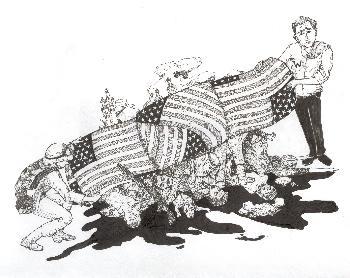
News
Summers Will Not Finish Semester of Teaching as Harvard Investigates Epstein Ties

News
Harvard College Students Report Favoring Divestment from Israel in HUA Survey

News
‘He Should Resign’: Harvard Undergrads Take Hard Line Against Summers Over Epstein Scandal

News
Harvard To Launch New Investigation Into Epstein’s Ties to Summers, Other University Affiliates

News
Harvard Students To Vote on Divestment From Israel in Inaugural HUA Election Survey
Bush's Last Chance in Iraq to Avoid Early Withdrawl

President Bush is now in danger of the furor over the Abu Ghraib prison horrors engulfing U.S. strategy toward Iraq at the very moment he faces huge last-chance political and military decisions there.
After June 30, Iraq will become a no man’s land. Everything about this next phase smacks of confusion and danger, even without the impact of the abuses by American personnel of Iraqi prisoners: semi-sovereignty mixed with insurrection, protracted ethnic-religious strife and discord over the nature of the yet-unformed permanent government. The U.S. military role will be subject to challenge under a quasi-Iraqi regime; both the definition of the U.N. mandate and U.S. support for it are up for grabs; international engagement is reticent; and the backing of the Iraqi people for a caretaker government indeterminate in both structure and jurisdiction can easily implode.
The administration doesn’t seem to realize that the opportunity for avoiding catastrophe in Iraq has all but slipped away in the face of its unwillingness to recast its strategy. Does it not comprehend the mess it’s in? Or is it paralyzed by the recognition of its predicament, lured by the conceit that any reality can be twisted into political advantage, or busied with planning for some other move we don’t know about? The situation may already be unrecoverable, even if the U.S. acts boldly and quickly. But without a final attempt, we will almost surely be facing the precipitous withdrawal with fearful consequences for Iraq, the global credibility of U.S. foreign policy and American politics.
The trouble we are in can be revealed by the recognition that the best available strategy now is the same one we rejected six months ago and continues to grow less viable every passing day.
First, the U.S. still needs to establish and sustain the security in Iraq—a responsibility it originally assigned itself but has never accomplished. Only we can do this. But without enough manpower and better logistics and equipment to intimidate the insurgency, the resistance forces have erupted and now will be much harder to put down. Despite the still concealed but ever-growing budget for Iraq, more troops are required to quash current violence and deter further insecurity. To pursue our continuing military obligations on the cheap endangers both our soldiers and the chances for avoiding real civil war in Iraq. But the domestic problems larger troop deployments would precipitate, with the military (regular, reserves and national guard) and their families, even without increased American coffins, are woeful to consider.
Second, the U.S. still should turn over unambiguous authority for both the political and reconstruction agendas to the United Nations, which should act in concert with other multilateral authorities. Certainly, U.S. must continue to play an essential supporting role, but the U.N. can earn credibility inside Iraq and can attract broad international participation, both of which are currently denied to the U.S. coalition. Despite its serious weaknesses, the U.N. is more experienced and competent in addressing these challenges and more successful in mobilizing help than we are.
The U.N. has currently undertaken two important assignments: working to put together the form of the Iraqi government to which “limited authority” will be passed over on June 30, and preparing for eventual general elections. This posture may signal its preferred stance, that is to accept specific projects within areas of special competence but to avoid taking over the lead role. The U.N. has become reluctant to accept full responsibility for the so-called civilian side, not only because it can read the perilousness of the situation it would now inherit, but because of its well-founded fears of continued manipulation and scapegoating at the hands of the U.S. We are now again second-guessing U.N. special envoy Lakhdar Brahimi, as well as quarreling among ourselves about whether the U.S. military or the U.S. Embassy should be in charge of reconstruction.
There are reasons why this two-part reshaping of U.S. strategy may not work, but there is no good plan left, and this strategy has the best chance of success. Departing in the midst of widening chaos for which we bear responsibility would be an awful outcome, but that prospect is looming and time is running out. If we continue to stumble along our stubborn path, any exit strategy we could then design would be particularly treacherous. If we seize this last chance and do our best to make it work we might succeed. If we failed, we would then still be better off navigating withdrawal and coping with its aftermath, perhaps with more respect and resiliency to work with both abroad and at home.
Jonathan Moore served as U.S. ambassador under Presidents Reagan and George H.W. Bush. He is now a senior advisor to the United Nations Development Program, and an Associate at the Shorenstein Center at Harvard’s Kennedy School.
Want to keep up with breaking news? Subscribe to our email newsletter.
